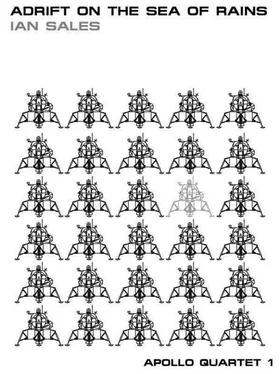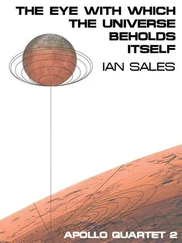Ian Sales
ADRIFT ON THE SEA OF RAINS
Some days, when it feels like the end of the world yet again, Colonel Vance Peterson, USAF, goes out onto the surface and gazes up at what they have lost.
In the grey gunpowder dust, he stands in the pose so familiar from televised missions. He leans forward to counterbalance the weight of the PLSS on his back; the A7LB’s inflated bladder pushes his arms out from his sides. And he stares up at that grey-white marble fixed mockingly above the horizon. He listens to the whirr of the pumps, his own breath an amniotic sussurus within the confines of his helmet. The noises reassure him—sound itself he finds comforting in this magnificent desolation.
If he turns about—blurring bootprints which might otherwise last for millennia—he sees the blanket-like folds of mountains, grey upon grey, and a plain of the same lack of colour, all painted with scalpel-edged shadows. Over there, to his right, the scattered descent stages of LM Trucks and Augmented LMs fill the mare; and one, just one, still with its ascent stage. Another, he knows, is nearly twenty years old, a piece of abandoned history; but he does not know which one.
A click from his radio reminds Peterson where he is. The voice of Major Philip Scott, USMC, his XO, follows:
We’re about ready to make another evolution.
Peterson glances at the Omega strapped about his spacesuited forearm and sees that he’s been out for half an hour. The PLSS is good for a seven-hour EVA. He says, I’ll watch it from out here.
Hope died months before. This is not a landscape in which hope can grow; these monochrome plains and mountains can sustain nothing, real or abstract. The Bell, Kendall’s torsion field generator, offers some prospect of salvation, but every evolution so far has left them in the same situation.
Another click precedes Scott’s dry, plodding voice: Thirty seconds.
This is the third evolution Peterson has witnessed from outside the base. It is safe enough. An area more than a mile in diameter is affected. He should see it—
There. Yes.
A ripple runs through the heavens. Above the lunar horizon, the Earth wavers and blurs… and then returns. But its skies still roil, sere and blasted. It is not the blue marble Peterson needs to see and, feeling lifeless inside, he tells Scott, Another dead one.
His thoughts are as grey and barren as the regolith on which he stands, so he shuffles about and begins to bounce back to sanctuary. Using his ankles, as the thickly-insulating spacesuit has very little range of movement at the knees, he propels himself forward in a low arc. Each time he lands, dust billows about him and then falls with eerie suddenness.
Peterson approaches the waist-high pole which marks the bulldozed ramp leading down into Rima Hadley and Falcon Base’s airlock. He stops hopping and adopts a slow-motion rocking shuffle, a safer gait for the approach to the hatch. He’s had plenty of time to learn how to get about in one-sixth gravity. Peterson should have rotated back to Earth after six months; he’s been here two years. Three of the base’s staff rotated themselves out after they learned they were alone: one overdose of sleeping pills, and two EVAs without spacesuits. Peterson despises them for their cowardice; he despises himself for believing salvation might be possible.
They are dead, all nine of them, unless the Bell finds them a home. Peterson knows it, he has learned to live with it, but he still finds it difficult to accept. It is a concept that is beyond his intellect to handle; it is not aerodynamics or orbital mechanics, subjects he finally mastered after weeks sitting on his ass in a classroom.
Peterson has removed his gloves, and just unlocked and pulled off his helmet, when the airlock’s inner hatch swings open. Scott steps carefully over the coaming, sneezes and puts the back of one hand up to his nose. Scott is sensitive to lunar dust.
The major follows Peterson through into the suiting up area, and then helps him out of his spacesuit, just as he assisted him into it earlier. He unscrews the hoses, lifts off the PLSS after Peterson unlatches the straps holding it to his back, and then unzips the A7LB’s pressure garment from the left hip around the back and up to the right shoulder. He asks, No luck then?
Looked the same as the others, Peterson replies sourly.
Scott shakes his head sadly. He has more bad news: Fulton’s not picked up any radio traffic on the S-band, he says.
Peterson contorts himself out of the spacesuit’s torso, and then worms out of its legs. Scott, a hand across his nose and mouth, sets about removing the lunar dust from the A7LB’s knees, shins and boots with a handheld vacuum cleaner.
What does Kendall say? Peterson asks. He strips off his LCG and pulls on a constant wear garment.
Scott turns from hanging up the spacesuit. The evolutions we’ve made are based on recent decision nodes, he says. Kendall claims we need to move further, ones with nodes years back in the past.
Peterson grunts. This is not unexpected. He asks, How far back?
The major shrugs and says, Twenty years maybe.
Not too far, goddamn it, or we could be even worse off.
They leave the airlock and enter the base. These close confines are all the home Peterson has known for the past twenty-four months, are all he can expect to know for the short period remaining of his life. Grey lockers on every wall, a carpetted floor to which his Velcro slippers stick and rip free with every step. After six years, everything in the base is as dilapidated, as battered, as Peterson feels. Pulled threads undulate like tiny kelp from the carpet; bright glints, falsely promising newness, shine from lockers’ worn edges and corners; the smell of burnt electronics, the cordite reek of regolith, the animal odours of men living in close proximity—all colour the air. After the rubber and sweat stink of the spacesuit, Peterson’s nose rebels at the palimpsest of aromas inside Falcon Base—but it will soon tire, and he’ll no longer register the smell, much as Peterson tires of life in these cramped cylinders part-buried beneath the lunar surface in the upper wall of Rima Hadley.
Kendall’s laboratory is at one end of the base, past the wardroom, gym and one of the habitation cylinders. Peterson grew up on B-movies and has spent years in the company of rocket scientists. He knows what a lab is supposed to look like, and Kendall’s resembles nothing of the sort. It is a room like every other room in Falcon Base, walled with grey lockers, and containing collapsible furniture made of drab aluminium tubing and plastic the colour of fresh-mown grass, a colour that mocks them now they have lost the Earth. A pair of consoles occupy one side of the lab, each dominated by the cyclopean gaze of a circular monitor screen ringed with switches and indicator lights.
The Bell—Kendall never calls it that, only the “torsion field generator”—is not in the lab. It is outside, sitting in the bottom of the rille and visible through a small window between the two consoles. Kendall did not invent the Bell; it is a Nazi Wunderwaffe. It glows an alien violet colour when activated.
Kendall, compact and saturnine, with a neat van dyke and a black gaze, and not the lunatic suggested by his field of study, scowls as Peterson enters the lab. He says, I’m scaling it back. I can’t afford to burn out more components.
Peterson is outraged, and shows it: Goddamn it, I’m not spending what little time we have left playing safe. I want to get somewhere before the supplies run out.
Kendall draws himself up. He has made no secret of his opinion of Peterson. He never wanted to be sent to the Moon to conduct his experiments. He’d be dead if he’d stayed on Earth, but he has never acknowledged as much. If, he says, my calculations are correct—
Читать дальше











![Edward Ellis - Adrift on the Pacific - A Boys [sic] Story of the Sea and its Perils](/books/753342/edward-ellis-adrift-on-the-pacific-a-boys-sic-s-thumb.webp)
